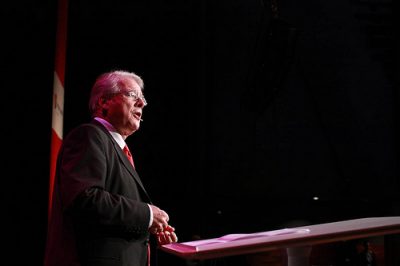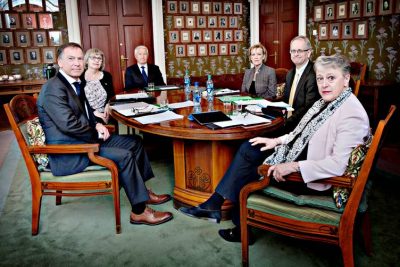UPDATED: Carl I Hagen, one of Norway’s most conservative and controversial politicians, has lost his lengthy and highly disruptive fight for a seat on the Norwegian Nobel Committee. His nomination had been fronted by the Progress Party he once led, but now it’s finally been made clear that Hagen was disqualified by a majority in Parliament.

The majority agreed Friday morning not to hold a customary vote over the Progresss Party’s choice of Hagen as its candidate for a seat on the Nobel Committee.
That ended Hagen’s and his party’s campaign for the seat once and for all, because Hagen remains an alternate Member of Parliament. A majority in parliament had already voted earlier in the week to rule both permanent and alternate Members of Parliament as ineligible for a seat on the Nobel Committee. In doing so, the majority was finally formalizing a 40-year-long practice of distancing the Nobel Committee from Parliament, to preserve its political independence in deciding who wins the Nobel Peace Prize.
Even though the Progress Party had long honoured that practice itself, and even invoked it on earlier occasions, the party’s most conservative faction had nonetheless maintained and defended Hagen as their candidate in defiance of the Parliament’s majority vote on Tuesday. They likened it to an attempt to grandfather in new rules that both changed and broke them in the middle of the game.
The stubbornness of both the party and Hagen to persist with his candidancy, despite all the opposition to it that caught the committee itself in the middle, continued to the bitter end on Friday. That forced the majority agreement against voting on the Progress Party’s choice, because of Hagen’s ineligibility. The party’s spot on the five-member committee, to which it’s entitled under the terms of Alfred Nobel’s will, is now expected to officially remain unfilled until the party nominates someone who is neither a permanent nor alternate MP. That won’t be Hagen, because his earlier attempts to resign or seek leave from his elected position of alternate MP were not allowed under the Norwegian Constitution.

Meanwhile, a majority in Parliament re-elected the Labour Party’s choice, Berit Reiss-Andersen, for one of its seats on the committee. Andersen, who is a prominent Norwegian lawyer and hasn’t held any political position for years, is thus also likely to continue as leader of the Nobel Committee, which will be officially awarding the Nobel Peace Prize on Sunday.
Another vacancy on the committee, left by the death of the committee’s former leader Kaci Kullmann Five, will be filled from January 1 by the Center Party’s choice after it won a seat on the committee following the September election. The Conservatives ceded its seat held by Five to the Center Party because of its strong election result. Center’s choice of its former leader, Anne Enger, faced no opposition in Parliament because she holds no elected roles at present.
The Progress Party’s unfilled seat, meanwhile, will also remain officially vacant since the Progress Party opted against re-nominating its current incumbent, Inger-Marie Ytterhorn, to make room for Hagen. Ytterhorn’s term expires December 31, and even though she had wanted to continue, the former Progress Party politician is now due to step down. The vacancy thus looks likely to be filled by the committee’s own first alternate member, Kristin Clemet, who was chosen by the Conservatives. Clemet is also a former politician and government minister for the Conservatives, but she hasn’t held elected office for years either, and thus faced no objections when she was chosen by the Conservatives as an alternate committee member suddenly moving up to fill the Progress Party’s vacancy.
Hagen made his bitterness known after his candidacy was blocked on Friday. He blamed it on Labour Party leader Jonas Gahr Støre, who led the move to finally formalize the previously unwritten rules against allowing either permanent or alternate MPs on the Nobel Committee. The formalization, however, is widely believed to have been spurred by Hagen’s candidacy because of fierce opposition to him both in Parliament and outside it. Hagen has a long record of controversial stands on immigration, human rights, Muslims and many other issues that some said made him unsuitable for a seat on a committee that champions peace and human rights.
It all became a political drama rarely seen in Norway. Now it’s hoped that all the uncertainty around the makeup of the Nobel Committee can also be removed, with attention shifting back to the upcoming Nobel Prize ceremony this weekend and away from the huge fuss stirred up by the Progress Party and Hagen himself.
Questions remain, meanwhile, over how the majority decisions in Parliament this week over committee eligibility will affect current committee member Thorbjørn Jagland. The decision not only banned all Norwegian MPs but also members of major international organizations that could lead to conflicts of interest on the committee. Jagland was initially chosen by the Labour Party in 2009 and reappointed in 2015, after he’d become secretary general of the Council of Europe. His term now runs until 2020, but calls are already going out that he should be replaced.
newsinenglish.no/Nina Berglund

